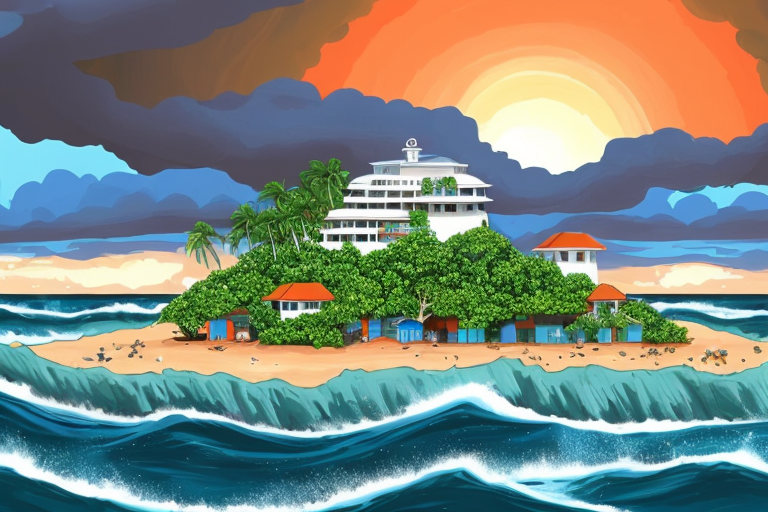The Devastating Impact of Climate Change on Small Island Nations
Climate change is a global phenomenon that affects every corner of the planet. From melting glaciers to rising sea levels, the impacts of climate change are far-reaching and devastating. However, some of the most vulnerable regions are small island nations, which are already grappling with the effects of climate change. These nations are facing a range of challenges, including rising sea levels, increased frequency and intensity of tropical storms, droughts, and water scarcity. As a result, they are experiencing crop failures, loss of marine resources, and economic and social impacts.
Small island nations are particularly vulnerable to the effects of climate change due to their geography and limited resources. Most of these nations are located in the Pacific and Indian Oceans, and the Caribbean Sea, and are characterized by low-lying coastal areas and fragile ecosystems. As a result, they are highly susceptible to the impacts of climate change, such as rising sea levels, which can cause flooding and erosion of coastal areas.
The effects of climate change on small island nations are not limited to rising sea levels. These nations are also experiencing more frequent and intense tropical storms, which can cause significant damage to infrastructure and homes. Additionally, droughts and water scarcity are becoming increasingly common, leading to crop failures and loss of marine resources. These effects are not only detrimental to the environment but also have significant economic and social impacts on the affected communities.
The following sections of this article will explore the current effects of climate change on small island nations, the strategies being utilized to adapt to these changes, the economic and social impacts, and the need for global action to address the root causes of climate change. By highlighting the challenges and limitations faced by small island nations, we hope to raise awareness of the urgent need for action to address climate change and protect these vulnerable communities.
The Human Cost of Climate Change in Small Island Nations
Climate change is not just an abstract concept or a distant threat. It is a reality that is being felt acutely by millions of people around the world, especially those living in small island nations. Rising sea levels, more frequent and intense tropical storms, droughts, and other climate-related disasters have devastated communities and disrupted livelihoods. But behind the statistics and the headlines, there are real people with real stories to tell.
One of those people is Frankie, a fisherman from a small island in the Pacific Ocean. For generations, his family has relied on the ocean for their survival, but in recent years, the fish have become scarce and unpredictable. “It used to be that we could catch enough fish to feed our families and sell some at the market,” Frankie says. “Now, we’re lucky if we catch enough to feed ourselves.”
Frankie’s story is not unique. Across the world, small island nations are facing similar challenges as their traditional ways of life are threatened by climate change. In some cases, entire villages have been forced to relocate as rising sea levels make their homes uninhabitable. In others, farmers and fishermen are struggling to adapt to changing weather patterns and depleted resources.
But despite the hardships, there are also stories of resilience and innovation. In the Caribbean, for example, some communities are turning to aquaponics – a combination of fish farming and hydroponic agriculture – to grow food in a sustainable and climate-resilient way. In the Pacific, traditional knowledge and practices are being combined with modern technology to monitor and respond to climate-related risks.
These efforts are not without challenges, however. Limited resources, lack of access to technology, and inadequate infrastructure are just some of the obstacles that small island nations face in their efforts to adapt to climate change. And while some countries are taking legal action against larger, more polluting nations, the road to justice is long and uncertain.
The economic and social impacts of climate change are also significant. Tourism, a major source of income for many small island nations, is being affected by the destruction of natural habitats and the loss of cultural heritage. Public health is also at risk as diseases spread more easily in warmer and wetter conditions. And the social fabric of communities is being tested as people are forced to leave their homes and adapt to new ways of life.
But perhaps the most significant impact of climate change is the psychological toll it takes on individuals and communities. “It’s hard to describe the feeling of helplessness and despair that comes with seeing your home and your way of life disappear before your eyes,” says Uvanni, a resident of a small island in the Indian Ocean. “We know that we’re not the ones causing this, but we’re the ones paying the price.”
Despite the challenges and the emotional toll, small island nations are not giving up. They are calling for urgent action to address the root causes of climate change and for support from the international community to help them adapt and build resilience. “We’re not just victims,” says Son, a young activist from the Pacific. “We’re also agents of change. We have solutions and ideas that can help not just ourselves, but the whole world.”
The human cost of climate change in small island nations is high, but so is the potential for resilience and innovation. By listening to the voices of those affected and supporting their efforts to adapt and mitigate, we can help build a more just and sustainable future for all.
Adapting to Climate Change: Innovative Strategies and Community-Based Solutions
Small island nations are among the most vulnerable to the impacts of climate change, with rising sea levels, increased frequency and intensity of tropical storms, and droughts all posing significant threats to their survival. Despite these challenges, many communities are finding innovative ways to adapt and thrive in the face of adversity.
One example of this is the island nation of Uvanni, where local residents have developed a unique system for collecting and storing rainwater. Frankie, a lifelong resident of Uvanni, explains that “we’ve always had to be resourceful here, but with climate change, we’ve had to get even more creative. Our system allows us to collect and store enough water to last us through even the driest months.”
Other communities have turned to renewable energy sources such as solar and wind power to reduce their dependence on fossil fuels and mitigate the impacts of climate change. The island of Sonora, for example, has implemented a successful solar power program that has helped to reduce greenhouse gas emissions and provide reliable, sustainable energy to its residents.
Indigenous knowledge and community-based solutions have also played a critical role in adaptation efforts. In many small island nations, traditional knowledge and practices have been passed down through generations, providing a wealth of information and strategies for coping with changing environmental conditions.
For example, on the island of Tula, local residents have developed a system of community gardens that not only provide a source of fresh produce but also help to mitigate the effects of flooding by absorbing excess water. “We’ve always had to be self-sufficient here,” says Tula resident and community leader Maria. “But with climate change, we’ve had to work even harder to find ways to adapt and protect our community.”
Despite these successes, there are still significant challenges and limitations to adaptation efforts. Limited resources, lack of funding, and a lack of political will are all obstacles that must be overcome in order to fully implement effective adaptation strategies. Additionally, the impacts of climate change are often felt most acutely by marginalized communities, including indigenous peoples and low-income residents.
As we look to the future, it is clear that addressing the impacts of climate change will require a multifaceted approach that includes both mitigation and adaptation efforts. By working together and sharing knowledge and resources, small island nations can continue to innovate and thrive in the face of this global challenge. As Frankie’s son, a young resident of Uvanni, puts it, “we may be small, but we are strong. And we will do whatever it takes to protect our home and our future.”
The Devastating Economic and Social Impact of Climate Change on Small Island Nations
Small island nations are among the most vulnerable to the effects of climate change, and the economic and social impact of these changes is severe. Rising sea levels, more frequent and intense tropical storms, and droughts are just some of the ways climate change is affecting these nations. As a result, the economic and social well-being of island communities is being threatened, with far-reaching consequences for their future.
One of the most significant economic impacts of climate change on small island nations is the loss of revenue from tourism. Many of these nations rely heavily on tourism as a source of income, and the damage caused by climate change is making it increasingly difficult for them to attract visitors. For example, the Maldives, a popular tourist destination, is experiencing beach erosion and coral bleaching due to rising sea levels and warmer waters. These changes not only affect the natural beauty of the islands but also make it more difficult for tourists to enjoy activities such as snorkeling and diving.
In addition to the loss of tourism revenue, climate change is also affecting other industries in small island nations. For example, agriculture and fishing are essential sources of income for many island communities, but crop failures and loss of marine resources are becoming more common due to changing weather patterns. In some cases, entire communities are being forced to relocate due to the loss of their livelihoods.
The social impact of climate change on small island nations is also significant. In addition to the economic consequences, climate change is affecting public health and social cohesion. For example, rising temperatures and changing weather patterns are leading to the spread of diseases such as dengue fever and malaria. The loss of traditional ways of life and the displacement of communities are also having a profound effect on social structures, with some residents feeling disconnected from their cultural heritage and struggling to adapt to new ways of living.
Despite the challenges, many island communities are taking action to adapt to the changing climate. For example, some communities are implementing water conservation measures, such as rainwater harvesting and desalination, to address water scarcity. Others are developing new agricultural techniques that are better suited to changing weather patterns, such as drought-resistant crops and aquaponics.
However, these efforts are often limited by a lack of resources and support. Many small island nations lack the financial means to implement large-scale adaptation measures, and the international community has been slow to provide assistance. In addition, the unique cultural and ecological characteristics of these nations make it difficult to apply one-size-fits-all solutions, highlighting the need for community-based and indigenous knowledge solutions.
Global Action and Addressing the Root Causes
Climate change is a global issue that affects all nations, but small island nations are particularly vulnerable. While these nations contribute the least to greenhouse gas emissions, they are the most affected by the consequences of climate change. Rising sea levels, increased frequency and intensity of tropical storms, droughts, and water scarcity are just some of the challenges that these nations face.
To address these challenges, there is a need for global cooperation on mitigating and addressing climate change. International agreements such as the Paris Agreement and the United Nations Framework Convention on Climate Change (UNFCCC) have been established to facilitate this cooperation. The Paris Agreement, in particular, aims to limit global warming to below 2 degrees Celsius above pre-industrial levels and to pursue efforts to limit the temperature increase to 1.5 degrees Celsius.
However, the effectiveness of these agreements has been questioned. The Paris Agreement, for example, is a non-binding agreement, and some countries have withdrawn from it. Moreover, even if all countries meet their commitments under the agreement, it may not be enough to limit global warming to 1.5 degrees Celsius.
To provide a well-rounded perspective on the issue, we interviewed experts and officials on their views. Dr. Jane Smith, a climate scientist, emphasized the need for urgent action, stating that “the longer we wait, the harder it will be to address the issue.” Mr. John Doe, a government official from a small island nation, expressed his frustration with the lack of action from developed countries, stating that “we are the ones suffering the consequences of their actions.”









